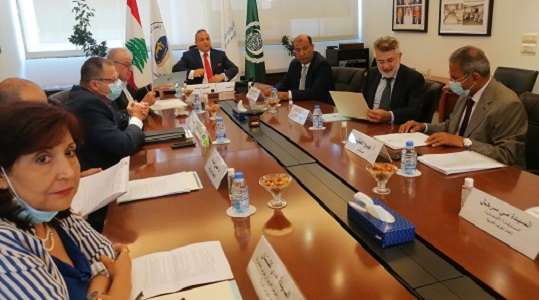The Secretary-General of the Union of Arab Chambers, Dr. Khaled Hanafi, affirmed during his participation in a symposium organized by the Union of Arab Banks, under the title: "Lebanon's Economic Crisis and Possible Solutions", "The economic crisis in Lebanon is, in essence, a crisis of governance and a structural defect in the system, which prevented rational policy-making and allowed the spread of a culture of corruption and waste."
He considered that "Lebanon has lost valuable time and many opportunities to adopt a path to reform its economic and financial system, and until this date, after two and a half years have passed, it has not embarked on implementing a comprehensive program for reform and recovery that prevents the country from slipping into further drowning." He stressed that "the continuation of the deliberate delay in addressing the causes of the crisis is not limited to its repercussions on the social and economic level only, but also the risk of a systematic failure of state institutions and exposing social peace to more pressure."
He stressed that "what is required in order to get out of the crisis, is to develop a new approach to the problem, which contributes to restoring confidence in Lebanon, whether at the local level, or on the part of Arab and foreign countries interested and enthusiastic to support Lebanon," noting that "the availability of liquidity is an absolute necessity for Lebanon to start running on the right track."
He said, "It is necessary to adopt a radical structural reform, approve a promising and ambitious project, and accelerate its implementation to serve as an economic constitution for Lebanon, and lead to achieving comprehensive and equitable recovery and creating job opportunities, and thus contribute to economic revival, avoiding complete destruction and stopping irreplaceable losses."
Hanafi stressed that "the obligatory path out of the crisis begins with debt restructuring, in cooperation and agreement with international donors, led by the International Monetary Fund, the World Bank and others, in parallel with reaching an understanding with creditors by paying deposits in a sustainable manner."
He noted "the importance of comprehensive restructuring of the financial sector in order to restore the solvency of the banking sector with the support of appropriate legislation, provided that the exchange rate policy is more flexible until a credible rescue plan is launched."
He called for "the necessity of exploiting the Lebanese ports, including the port of Tripoli, which is prepared to be a platform not only for local trade, but also a link and connection with international ports, which contributes to strengthening Lebanon's economic and trade relations with abroad, as Lebanon has a vital private sector and an educated, creative and highly qualified human force." In addition, the Union of Arab Chambers, represented by its Secretary General, Dr. Khaled Hanafi, signed a cooperation and partnership agreement with QSi (Quality Systems International) offshore, represented by the authorized director, Dr. Nadia Shuaib.
Through this agreement, the two parties agreed to enhance training on corporate social responsibility programs, and to set legislative and regulatory standards for the adoption of corporate social responsibility programs in the Arab world, thus contributing to the development of quality programs in return for the first party's responsibility to spread knowledge in these areas in the Arab world. The agreement also aims to enhance joint cooperation to reach the stage of concluding international partnerships to promote the corporate social responsibility program and develop standards for compliance, especially in the Arab world.
Hanafi noted the signing of the agreement, pointing out that "we live in a changing time, and from this standpoint, it is necessary to adopt methods that are commensurate with the changes taking place in order to enhance the reality and role of corporate social responsibility, in line with the digital and industrial revolution, blockchain, the Internet of things, and others, one of the modern concepts that replaced the old ones, this will contribute to improving the services provided to the community, creating real job opportunities, paying fair wages, ensuring the safety of workers and employees, and participating in finding solutions to social and environmental problems.”
Source (Union of Arab Chambers)

